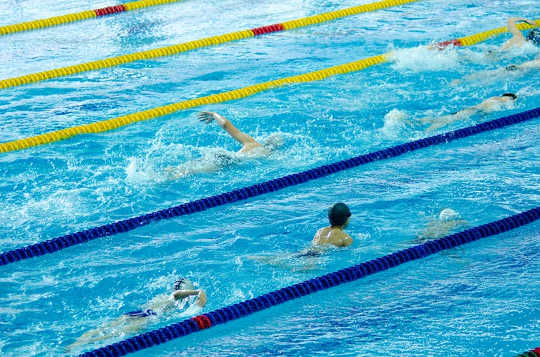
The busier the pool, the worse it is. Shutterstock
It’s recently been reported that scientists have managed to create a test to measure how much urine is in a swimming pool. It seems that peeing in the pool has become commonplace, and even high-profile swimmers have admitted to doing it during rigorous training sessions, arguing that the chlorine “kills it”. Not only is this untrue, but the chemical reaction that occurs between your pee and the chlorine creates a chemical that has been linked to asthma and other respiratory issues.
Nitrogen trichloride, also known as trichloramine, is made when the urea in your pee reacts with chlorine – the disinfectant widely used in swimming pool water. Nitrogen trichloride is largely made by accident in pools these days, but this compound was originally made for interest in 1812 by Pierre Louis DuLong.
DuLong made the chemical by bubbling chlorine gas through a solution of ammonium chloride. But, despite his success, DuLong’s joy at having made it was probably short-lived – he hadn’t counted on the fact that it would be explosive – the chemical exploded without warning and cost him an eye and a finger. It’s extremely sensitive and will explode even under gentle shock or when exposed to sunlight.
Get The Latest By Email
Scientists Sir Humphry Davy and Michael Faraday also fell victim to the substance when they repeated DuLong’s work shortly after. An explosion also caused Davy to lose the use of an eye temporarily and Faraday did permanent damage to his fingers.
Luckily for professional swimmers, only pure nitrogen trichloride is explosive, and so the fact that it is mixed with water and other substances in a swimming pool should be reassuring. However, research suggests that nitrogen trichloride, among other products formed when you pee in chlorinated water, such as chloramine and dichloramine, is linked to eye and upper airway irritation.
It’s rather ironic that the chlorine that is used to kill bacteria and protect the health of swimmers, is linked to the creation of toxic chemicals. But also that the aroma that people associate with a clean pool, is actually the stench of nitrogen trichloride and an indicator of plenty of pee.
Occupational health hazard
It is a volatile chemical, meaning it easily turns into a gas and hangs around in the air around the pool. One study has shown that people who work in swimming pools or spend a lot of time around them, such as lifeguards, have a higher level of airway issue symptoms in comparison with the general population – poolside workers showed more frequent work-related upper respiratory issues than administrative staff.
It’s reported that one study found that a public swimming pool of 830,000 litres, can contain as much as 75 litres of urine in the water at one time, which could react to form nitrogen trichloride. This may not sound like a lot, but the toxicity of chemicals is often in the dose and repeated exposure, so even low levels of nitrogen trichloride, will have damaging health effects.
But it isn’t just pee that we should worry about – the dirt on people’s bodies can consume up to 30% of the chlorine in the water on its own and in athletic swimmers, sweat – which also contains urea – can also contribute to the production of nitrogen trichloride.
So what can we do to combat it? Research which models the amounts of nitrogen trichloride in a swimming pool over time has led some researchers to suggest that lowering the levels of chlorine in a pool, while remaining above the legal lower limit, would reduce the amount of chlorine available to react to form the toxic chemical. However, this study was limited to a single pool, so more research is required to establish whether this could be a feasible solution.
Don’t pee like a pro
Swimming pools have long encouraged swimmers to take a shower before they swim, but the health implications of not showering are not emphasised enough. It’s not enough to recommend a shower to “reduce irritants” – swimmers need to know that these irritants can cause respiratory issues, and not just for them but also the pool staff.
Swimmers should also be encouraged to pee before they get into the pool, something that should extend to elite athletes too – Michael Phelps might think it’s an accepted part of the sport, but it only gives licence to others if the professionals are doing it – they need to lead the way in pool hygiene.
![]() Unfortunately, the “swimming pool dye” which changes colour on pee contact seems to be a mere myth in most countries and there do not appear to be any feasible alternatives to chlorine which can disinfect a pool and not expose the staff to some harmful chemicals. So maybe it’s best to keep up the pretence if the prospect of embarrassment means people will actually go to the toilet.
Unfortunately, the “swimming pool dye” which changes colour on pee contact seems to be a mere myth in most countries and there do not appear to be any feasible alternatives to chlorine which can disinfect a pool and not expose the staff to some harmful chemicals. So maybe it’s best to keep up the pretence if the prospect of embarrassment means people will actually go to the toilet.
About The Author
Simon Cotton, Senior Lecturer in Chemistry, University of Birmingham and Laura Finney, PhD Candidate, University of Nottingham
This article was originally published on The Conversation. Read the original article.
Related Books







